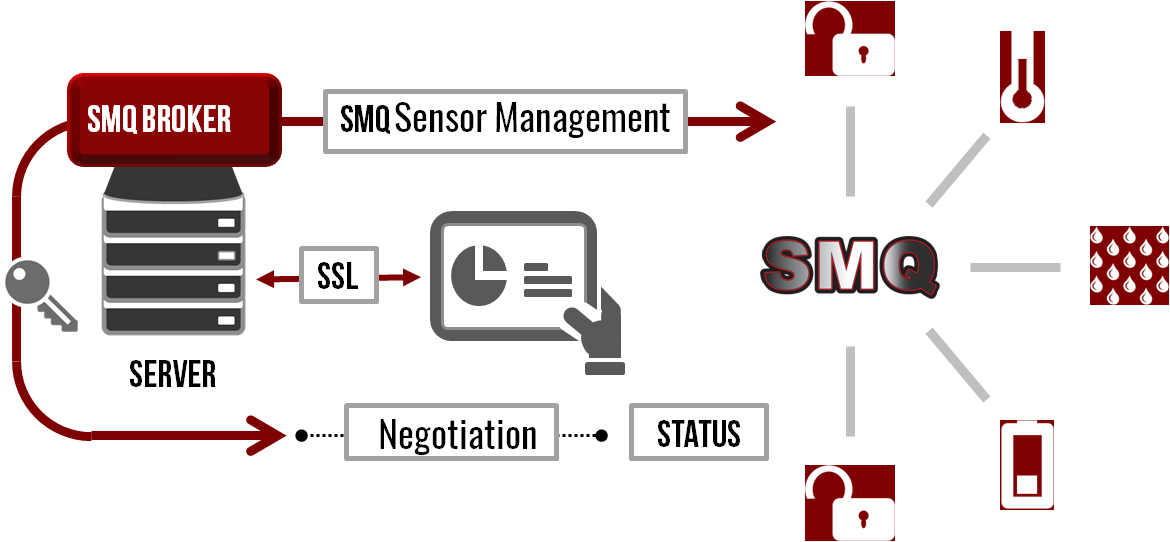Example program that shows how to use the Secure (TLS) SharkMQ library included in SharkSSL-Lite
Dependencies: EthernetInterface SharkSSL-Lite mbed-rtos mbed
Introduction
The SMQ Architecture is an Internet of Things (IoT) publish subscribe end-to-end solution that is optimized for embedded systems to provide instantaneous Device Edge Node connectivity, 1 to 1 Communications, and Ease of Transcending Firewalls. The solution is ideal for resource constrained devices that require real-time dynamic control, analytic information, and firmware updates in both LAN and WAN environments.
Architecture Component List
- SMQ C Client (Non-secure)
- SharkMQ Secure C Client (this mbed example)
- SMQjs (Javascript)
- SMQ JAVA
- SMQ Broker

SharkMQ-LED-Demo
An example of (Secure) device control via a Browser interface. It includes the LED demonstration example code, SharkMQ, and SharkSSL SSL|TLS stack for authentication and encryption.
- Code Size: 21kB ROM | 4kB RAM.
- Requires: SharkSSL-Lite
Video Tutorials
How to setup your own secure SMQ IoT cloud server
Most IoT cloud server solutions, whether they provide ready-to-use hosted services or not, are based on a standard Virtual Private Server (VPS). Most developers probably think of Amazon or Microsoft Azure's services when considering the server side of their IoT solution. These high-end services are great if you need to scale up to millions of connected devices. However, for most small-scale operations and DIY projects, a low-cost VPS is more than adequate.
SMQ LED Demo
See Also
- SMQ Client-Example (NonSecure) SMQ Client LED Demonstration.
- SMQ LED Demonstration Tutorial
- SMQ Documentation
- Real Time Logic LLC public SMQ Broker access.
- How to set up your own low cost SMQ Broker cloud server solution Tutorial.
Diff: main.cpp
- Revision:
- 1:7099d4432b41
- Parent:
- 0:10b4212318d4
- Child:
- 2:fd1c5fac2380
--- a/main.cpp Wed Apr 06 01:19:36 2016 +0000
+++ b/main.cpp Fri Apr 08 15:28:51 2016 +0000
@@ -1,4 +1,3 @@
-
#include "mbed.h"
#include "ledctrl.h"
#include "EthernetInterface.h"
@@ -31,14 +30,17 @@
}
};
-static int leds[sizeof(ledInfo)/sizeof(ledInfo[1])];
+#define LEDSLEN (sizeof(ledInfo) / sizeof(ledInfo[0]))
+
+static int leds[LEDSLEN];
/* Returns the LED on/off state for led with ID 'ledId'.
*/
int getLedState(int ledId)
{
- baAssert(ledId >= 1 && ledId <= sizeof(ledInfo)/sizeof(ledInfo[1]));
- return leds[ledId-1];
+ if(ledId >= 1 && ledId <= LEDSLEN)
+ return leds[ledId-1];
+ return 0;
}
@@ -54,7 +56,7 @@
*/
const LedInfo* getLedInfo(int* len)
{
- *len = sizeof(ledInfo) / sizeof(ledInfo[0]);
+ *len = LEDSLEN;
return ledInfo;
}
@@ -64,21 +66,21 @@
*/
extern "C" const char* getDevName(void)
{
- return "mbed: Arch Pro";
+ return "mbed: Arch Pro : SharkSSL-Lite";
}
static void blinkAll(int fast)
{
int i;
- for(i = 1 ; i <= 4 ; i++) setLed(i, FALSE);
- for(i = 1 ; i <= 4 ; i++)
+ for(i = 0 ; i < LEDSLEN ; i++) setLed(ledInfo[i].id, FALSE);
+ for(i = 0 ; i < LEDSLEN ; i++)
{
- setLed(i, TRUE);
+ setLed(ledInfo[i].id, TRUE);
wait_ms(fast ? 120: 400);
}
- for(i = 1 ; i <= 4 ; i++)
+ for(i = 0 ; i < LEDSLEN ; i++)
{
- setLed(i, FALSE);
+ setLed(ledInfo[i].id, FALSE);
wait_ms(fast ? 120: 400);
}
}
@@ -101,17 +103,20 @@
*/
extern "C" int setLed(int ledId, int on)
{
- baAssert(ledId >= 1 && ledId <= sizeof(ledInfo)/sizeof(ledInfo[1]));
- leds[ledId-1] = on;
- on = on ? 0 : 1; /* Invert */
- switch(ledId)
+ if(ledId >= 1 && ledId <= LEDSLEN)
{
- case 1: led1 = on; break;
- case 2: led2 = on; break;
- case 3: led3 = on; break;
- case 4: led4 = on; break;
+ leds[ledId-1] = on;
+ on = on ? 0 : 1; /* Invert */
+ switch(ledId)
+ {
+ case 1: led1 = on; break;
+ case 2: led2 = on; break;
+ case 3: led3 = on; break;
+ case 4: led4 = on; break;
+ }
+ return 0;
}
- return 0;
+ return -1;
}
@@ -135,8 +140,8 @@
extern "C" void setProgramStatus(ProgramStatus s)
{
- int i;
- for(i = 1 ; i <= 4 ; i++) setLed(i, FALSE);
+ int i;
+ for(i = 0 ; i < LEDSLEN ; i++) setLed(ledInfo[i].id, FALSE);
switch(s)
{
case ProgramStatus_Restarting:
@@ -146,21 +151,21 @@
break;
case ProgramStatus_Connecting:
- setLed(1, TRUE);
+ setLed(ledInfo[1].id, TRUE);
break;
case ProgramStatus_SslHandshake:
- setLed(2, TRUE);
+ setLed(ledInfo[2].id, TRUE);
break;
case ProgramStatus_DeviceReady:
- for(i = 1 ; i <= 4 ; i++) setLed(i, TRUE);
+ for(i = 0 ; i < LEDSLEN ; i++) setLed(ledInfo[i].id, TRUE);
wait(1);
- for(i = 1 ; i <= 4 ; i++) setLed(i, FALSE);
+ for(i = 0 ; i < LEDSLEN ; i++) setLed(ledInfo[i].id, FALSE);
break;
case ProgramStatus_CloseCommandReceived:
- blink(3);
+ blink(ledInfo[3].id);
break;
default:
@@ -172,20 +177,20 @@
case ProgramStatus_WebServiceNotAvailError:
case ProgramStatus_InvalidCommandError:
case ProgramStatus_PongResponseError:
- blink(1);
+ blink(ledInfo[1].id);
break;
case ProgramStatus_ConnectionError:
- blink(2);
+ blink(ledInfo[2].id);
break;
case ProgramStatus_CertificateNotTrustedError:
case ProgramStatus_SslHandshakeError:
- blink(3);
+ blink(ledInfo[3].id);
break;
case ProgramStatus_MemoryError:
- for(i = 1 ; i <= 4 ; i++) blink(i);
+ for(i = 0 ; i < LEDSLEN ; i++) blink(ledInfo[i].id);
break;
}
}